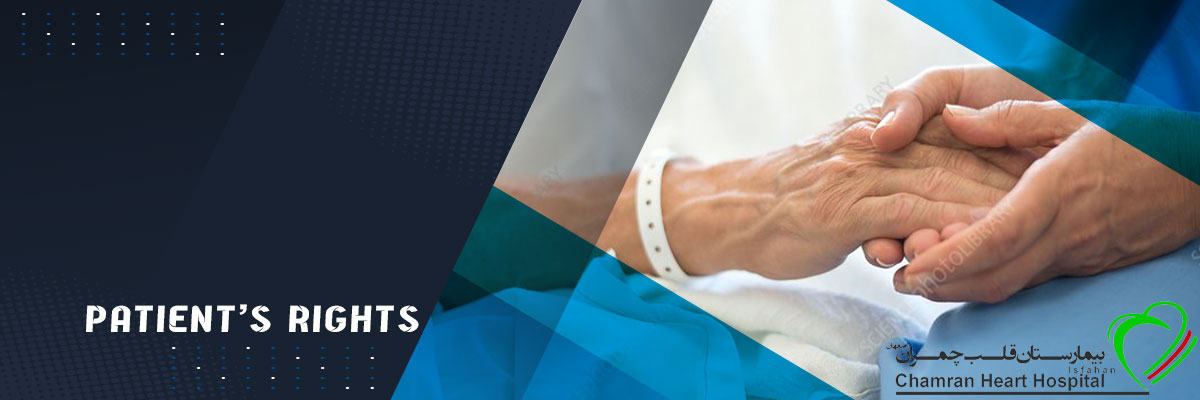
Charter of Patient’s Rights
- Receiving quality care is the right of every patient
- Compatible with human dignity and according to personal values, and cultural and religious beliefs.
- According to honesty, fairness, politeness and kindness;
- Without any discriminations based on ethnicity, culture, religion, type of disease or gender;
- Based on updated knowledge
- Based on patient’s interests
- Distribution of healthcare resources must be according to equality and treatment priorities
- According to pillars of healthcare including prevention, diagnosis, treatment and rehabilitation;
- Be delivered along with all necessary welfare facilities and without any unnecessary pain or suffering
- Especially sensitive to the rights of vulnerable groups including children, pregnant women, elderly, mental patients, prisoners, individuals with mental and physical disabilities and people without legal guardians.
- Be delivered in the shortest possible time while considering the patient’s schedule
- Be delivered while considering variables such as language, gender and age of the patient
- Emergency care should be delivered without considering the costs and other services (elective services) must be delivered according to regulations.
- In emergency care, if delivery of suitable services is not possible, it is necessary to transfer the patient to a suitable location after explaining the situation to patient and escorts.
- At the final stages of life, under irreversible conditions and inevitable death, the aim of the care is to increase patient’s comfort, reduce pain and suffering and meet the emotional, social and spiritual needs of patient and family members. A dying patient is allowed to spend their last moments with those they are close to.
Information should be delivered fully and sufficiently to the patient
Information includes the following details:
- Charter of patient’s rights during admission
- Predictable hospital regulations and costs including medical and non-medical costs and insurance regulations and introduction of support system during admission
- Name, position and professional rank of medical team in charge of patient’s care including physician, nurse, intern and their professional relations
- Diagnosis and treatment methods and their strengths and weaknesses an any possible complications, the diagnosed conditions, information and possible symptoms and all other information important during patient’s treatment
- Method for contacting attending physician and other members of medical team during treatment
- All interventions with experimental nature
- Necessary education for continuous treatment
Information should be delivered according to the following regulations:
- Information should be delivered at an appropriate time and location, based on patient’s condition including anxiety, pain and personality characteristics such as language, education and mental capacity unless:
- a) Delays in treatment can lead to harming the patient (in this case, information should be delivered immediately after the emergency treatment at an appropriate time).
- b) Patient refuses their right to information. In this case the patient’s choice must be respected unless lack of information can have serious consequences for the patient or other people.
- Patient can have access to all the information in their medical file and can receive a copy of their files and request revisions of any mistakes.
Patient’s choice and right for free decision-making during healthcare services must be respected
Patient is the final decision-maker in the following situations:
- Selection of attending physician and healthcare centers based on regulations;
- Selecting and asking for second opinions from other physicians as consultants;
- Participation or lack of participation in any studies while knowing that lack of participation will not affect their quality of care;
- Accepting or rejecting treatment options after receiving information regarding side effect and complications except for suicide patients or in cases while refusal will have serious consequences for other individuals;
- Patient’s opinion regarding future treatments should be recorded when the patient has the ability to make decisions and be used as guidance for future medical actions when patient lacks proper decision-making ability by healthcare providers and replacement decision-makers and according to legal principles;
- The conditions for choice and decision-making include the following:
- Patient’s choice and decisions should be free, informed and based on comprehensive and sufficient information (as stated in second article)
- After delivering the information, patient should be given enough time to reach a decision.
Healthcare delivery should be according to patient privacy and confidentiality
- Following confidentiality is necessary regarding all patient information unless in cases specified by the law.
- In all stages of care including diagnosis, and treatment, patient’s privacy should be respected. It is necessary to provide all necessary facilities in order to protect patient’s privacy.
- Only patient, medical team, and people authorized by the patient or through legal means can have access to patient’s information;
- Patient is allowed to have a trusted escort during diagnosis and visitations. Children should always be accompanied by one of their parents unless being accompanied is against medical advice.
Patients have the right to access an effective complaint management system
- Each patient is allowed to complain to proper authorities regarding violation of rights stated in this charger without fearing change in the quality of care;
- Patient is allowed to know about the process of managing their complaint;
- Any damages caused through negligence of healthcare providers must be repaid in the shortest possible time after being proven through legal means.
